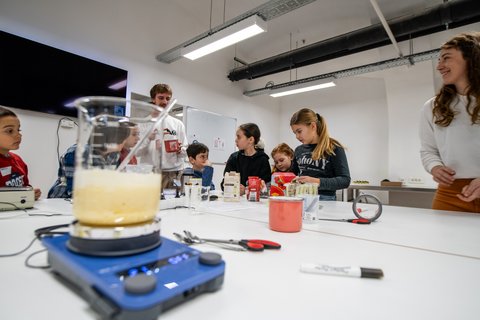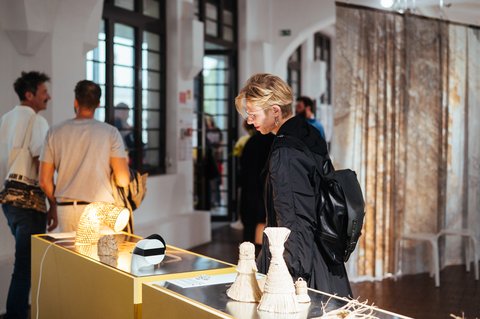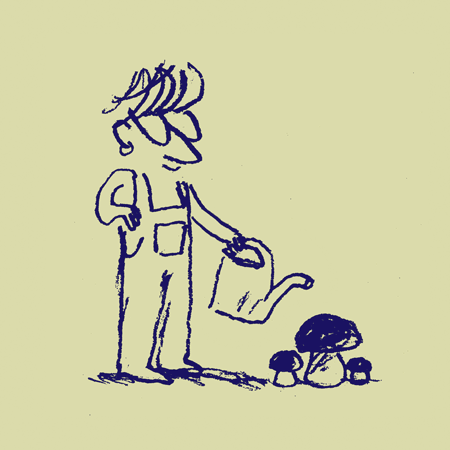Shemakes workshops: Innovative Cellulosic and Biomaterials
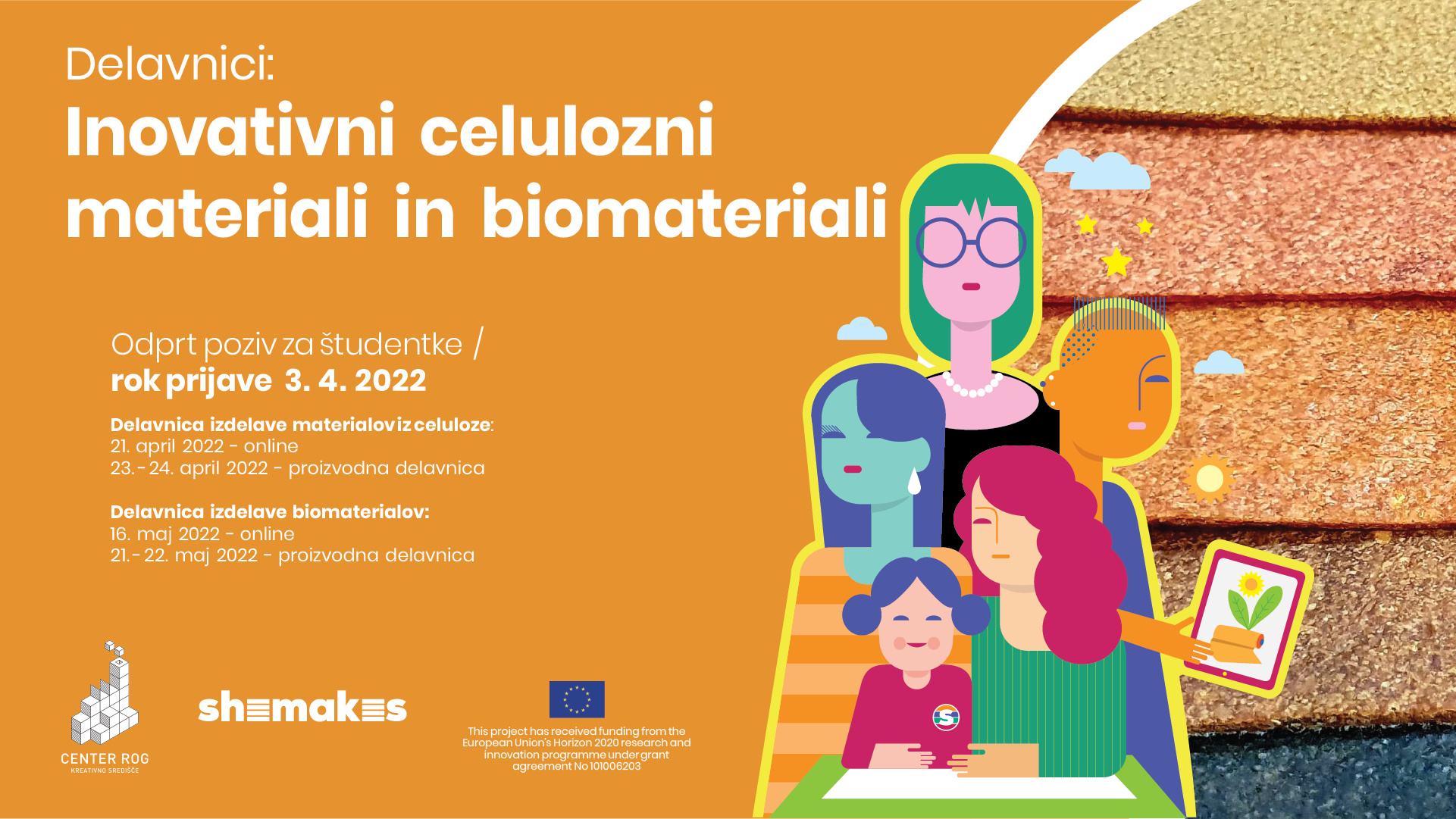
Women studying textile and fashion design, architecture, industrial design, biology or chemical technology are invited to apply for a place at a workshop on the creation of innovative biomaterials.
In this 3-day workshop you will learn how to develop and make innovative biomaterials from natural polymers, kombucha, cellulose and food waste. If you want to find out where and how to start developing and experimenting with your own biomaterials with a view to launching your own environmentally-friendly and responsible production, then this workshop is for you. The appeal of biomaterials lies in their accessibility, diversity, biodegradability, environmental friendliness and, most of all, the role they will play in the future of the textile and clothing industry.
- Cellulosic Materials Workshop
/21. 4. online, 23. – 24. 4. 2022 production workshop in Ljubljana
The first workshop will focus on making materials from cellulose. You will learn how to make cellulosic materials out of kombucha, onion peels, garlic skins, coffee husks, ginger, apple etc. It will be led by Anastasia Pistofidu from the IAAC and co-mentored by Dr Mija Sežun and Dr Igor Karlovits from the Pulp and Paper Institute. - Biomaterials Workshop
/16. 5. online, 21. – 22. 5. 2022 production workshop in Ljubljana/
The second workshop will focus on working with biomaterials. You will learn how to make biopolymers with gelatine, agar-agar, sodium alginate, tapioca starch, pine resin, cellulose (CMC). It will be led by Lucrecia Strano a creator of STRANO microfactory and co-mentored by Uroš Novak from the National Institute of Chemistry.
Students can register for one or both workshops. Please complete the application form, stating why you would like to attend. A separate application must be submitted for each workshop, and the deadline for receipt of applications is 3 April 2022.
Scholarships covering the cost of travel and accommodation for the duration of the production workshop in Ljubljana are available for four participants from Albania, Bosnia and Herzegovina, Bulgaria, Croatia, Greece, Montenegro, North Macedonia, Romania, Serbia, Kosovo and Turkey.
The successful applicants will be notified by 6 April 2022.
The workshops will be held in English and are a part of the Shemakes project.
Workshop mentors
Cellulosic Materials Workshop:
Anastasia Pistofidou is a long-standing member of the core team of IAAC Fab Lab Barcelona, having acted as a tutor, office manager for advanced manufacturing, coordinator and researcher. In 2013 she founded Fab Textiles, a research lab combining digital technologies and crafts with a focus on soft fabrication, textiles and materials. She is involved in setting up textile labs both as part of the Fab Lab Network and beyond, and also works with Fabricademy, Textile and Technology, a distributed education programme that shares open-source practices for innovation in the textile and clothing sector. In 2021 she co-led Remix El Barrio, a project to make biomaterial from food waste that won the European Starts Prize. She also works with the Fabship project to develop off-grid fablabs in rural areas.
Mija Sežun, PhD, studied biological and biotechnological sciences in the field of environmental safety. She spent several years as a researcher at the Environmental Engineering Laboratory before deepening her expertise at the Pulp and Paper Institute, where she works on finding ways of preventing, reducing and reusing waste material. Her biotechnological focus is on the reuse of biowaste with the aim of obtaining high value-added products such as green chemicals, enzymes, oligosaccharides, etc. She is also working to identify the characteristics of lignocellulosic biomass and sustainable uses for it.
Igor Karlovits, PhD, obtained his masters degree and doctorate in graphic engineering and design from the University of Novi Sad (Faculty of Technical Sciences), and also mentored several diploma and masters students. As Head of Production at DSSmith Slovenija doo, an industry leader in the production of cardboard packaging, he was responsible for management and operations. He is currently employed at the Pulp and Paper Institute as a senior research associate and head of the print and packaging department
Biomaterials Workshop:
Lucrecia Strano is a fashion & textile designer, biomaterials researcher and maker. She's a creator of STRANO microfactory, a sustainable small scale biomaterial supplier for designers and artists, for every creative person that chooses a new way to produce, consume, and have the courage to believe in this new path. STRANO was born as Lucrecia's Fabricademy final project in 2020 and since then it has provided materials, mentorship and workshops to empower others' projects and believe together in a better world.
Uroš Novak, Ph.D. in Chemical Engineering. Research group leader for bioplastics, biocomposites and zero-waste technologies at the National Institute of Chemistry, Slovenia. Skilled in research and development (R&D), start-up development, chemical engineering and science, with more than 10 years' experience. Author of 35+ scientific articles, speaker at 100+ events. Passionate about transforming science into practical solutions. Coordinator of the BioApp plastic-free lifestyle movement, facilitating technological innovation based on upcycling abundant biopolymer resources in order to develop services to meet the needs of the food, cosmetics and health-related industries. Co-founder and CTO of two start-ups, 123zero and AWAE. Finalist in the 2019 European Social Innovation Competition, “Challenging Plastic Waste”.
About Shemakes
Shemakes is a network of people working in labs or businesses who are actively helping increase the skills, confidence and status of women in the textile and clothing industry. Together, we are addressing the challenges facing women in the industry: their over-representation in the lowest-paid jobs, the systemic gender constructs that affect their status, and the low value assigned to their natural and acquired skills within traditional business structures. We strive to create opportunities and business structures (circular, sustainable, near-shored) that enable women to move into more senior, better-paid positions by giving them access to hard skills, technology and innovation as well as to networking, business modelling and role models.
This project has received funding from the European Union’s Horizon 2020 research and innovation programme under grant agreement no. 101006203. The views expressed herein reflect those of the author and the shemakes consortium; the EU/Commission is not responsible for any use that may be made of the information contained.
Production: Rog Centre
Co-production: IAAC, National Institute of Chemistry, Pulp and Paper Institute, Shemakes network
See more
JSP
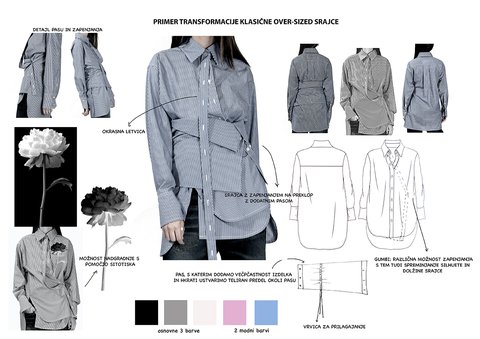
The fashion industry addresses a mature woman with idealized youthful concepts of clothing that do not meet her needs. That is why fashion designer Jelena Proković from the JSP collective will offer women after 50 years a stylish platfor...

